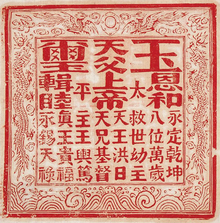Jintian uprising


The Jintian uprising ( Chinese 金田 起义 , Pinyin Jintian qiyi ) marked the beginning of the Sino-Christian kingdom of the Taiping movement in the mid-19th century.
Origin and course
Hong Xiuquan (1814–1864), the leader of the uprising, came from a farming family in Hua County in Guangdong Province. After founding the Society for the Worship of God (拜 上帝 會, Bai shangdi hui), he later called the uprising in Jintian Village , Guiping County , Autonomous Region on January 11, 1851, his 30th birthday (according to the traditional Chinese calendar) Guangxi , out. He organized his own army and called his regime the "Heavenly Kingdom of Eternal Peace" ( Taiping Tianguo ), his army "Army for Eternal Peace" (Taiping jun 太平 军) and proclaimed himself its "Heavenly King" (Tian wang 天王).
In September 1851, the Taiping Army captured Yong'an (永安) City (now Mengshan County , Guangxi Autonomous Region ) and established a new military and political system.
The Qing government sent strong troops to encircle the city. In April 1852, the Taiping Army broke through the encirclement and moved north from Guangxi via Hunan , where they were enthusiastically welcomed and considerably reinforced by the local population, then attacked Hubei .
In January 1853, they occupied Wuchang (which is now part of Wuhan ), the capital of Hubei Province . In the meantime it had grown to 500,000 men. In February it gave up the city and moved east along the Yangtze River . The Qing forces collapsed without a fight. In March 1853, the Taiping Army captured the city of Nanjing , renamed it Tianjing天京 (Heavenly Capital) and declared it the capital of the Heavenly Kingdom of Eternal Peace. The Chinese Qing government was confronted with this state power for more than ten years, until 1864, when Zeng Guofan (1811–1872) and his troops, the Xiang Army (湘軍, Xiang jun), defeated the Heavenly Empire Taking Nanjing under his leadership was finally crushed.
The site of the uprising in Jintian Village in Guiping City has been on the List of Monuments of the People's Republic of China (1-2) since 1961 , the former residence of the Heavenly King of the Heavenly Kingdom of Eternal Peace in Nanjing since 1982 (2-2) , the former home of Hong Xiuquan in Guangzhou since 1988 (3-1) ; and the Yong'an activities of the Heavenly Realm of Eternal Peace in Mengshan County , Guangxi, since 2006 (6-1023) .
See also
literature
- Kil Yong Lee: Taiping Tianguo and Donghag. A religious studies study of the development process of the two new religious movements . Marburg (Diss.) 2003 ( Online )
Web links
- The Taiping Peasant War ( Radio China International )
- Site of the Jintian Uprising (English)
- Old Residence of Hong Xiuquan (English)
- Site of the Heavenly-King Palace of the Taiping Heavenly Kingdom (English)
- Taiping tianguo nianpu (Chronology, Chinese)
- Taiping Rebellion Museum (Chinese)